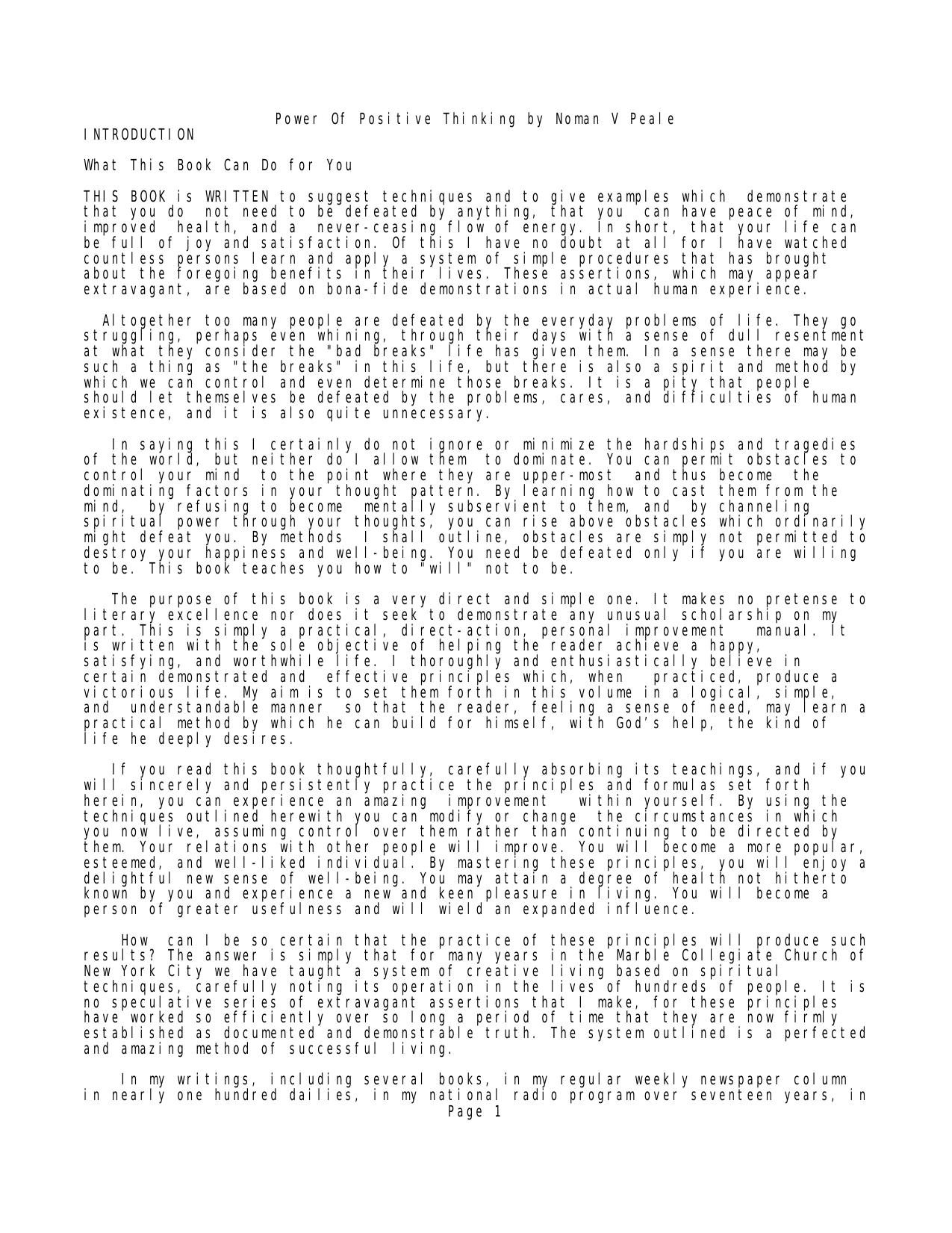The Power of Positive Thinking by Norman Vincent Peale

Author:Norman Vincent Peale [Peale, Norman Vincent]
Language: eng
Format: epub, mobi, pdf
Publisher: FIRESIDE
Published: 1952-10-28T18:30:00+00:00
9
How to Break the Worry Habit
YOU DO NOT need to be a victim of worry. Reduced to its simplest form, what is worry? It is simply an unhealthy and destructive mental habit. You were not born with the worry habit. You acquired it. And because you can change any habit and any acquired attitude, you can cast worry from your mind. Since aggressive, direct action is essential in the elimination process, there is just one proper time to begin an effective attack on worry, and that is now. So let us start breaking your worry habit at once.
Why should we take the worry problem this seriously? The reason is clearly stated by Dr. Smiley Blanton, eminent psychiatrist, “Anxiety is the great modern plague.”
A famous psychologist asserts that “fear is the most disintegrating enemy of human personality,” and a prominent physician declares that “worry is the most subtle and destructive of all human diseases.” Another physician tells us that thousands of people are ill because of “dammed-up anxiety.” These sufferers have been unable to expel their anxieties which have turned inward on the personality, causing many forms of ill-health. The destructive quality of worry is indicated by the fact that the word itself is derived from an old Anglo-Saxon word meaning “to choke.” If someone were to put his fingers around your throat and press hard, cutting off the flow of vital power, it would be a dramatic demonstration of what you do to yourself by long-held and habitual worry.
We are told that worry is not infrequently a factor in arthritis. Physicians who have analyzed the causes of this prevalent disease assert that the following factors, at least some of them, are nearly always present in arthritic cases: financial disaster, frustration, tension, apprehension, loneliness, grief, long-held ill will, and habitual worry.
A clinic staff is said to have made a study of one hundred seventy-six American executives of the average age of forty-four years and discovered that one half had high blood pressure, heart disease, or ulcers. It was notable in every case of those thus afflicted that worry was a prominent factor.
The worrier, so it seems, is not likely to live as long as the person who learns to overcome his worries. The Rotarian magazine carried an article entitled “How Long Can You Live?” The author says that the waistline is the measure of your life line. The article also declares that if you want to live long, observe the following rules: (1) Keep calm. (2) Go to church. (3) Eliminate worry.
A survey shows that church members live longer than non-church members (better join the church if you don’t want to die young). Married people, according to the article, live longer than single people. Perhaps this is because a married couple can divide the worry. When you are single, you have to do it all alone.
A scientific expert on length of life made a study of some 450 people who lived to be one hundred years of age. He found that these people lived long and contented lives for the following reasons: (1) They kept busy.
Download
The Power of Positive Thinking by Norman Vincent Peale.epub
The Power of Positive Thinking by Norman Vincent Peale.mobi
The Power of Positive Thinking by Norman Vincent Peale.pdf
This site does not store any files on its server. We only index and link to content provided by other sites. Please contact the content providers to delete copyright contents if any and email us, we'll remove relevant links or contents immediately.
The 5 Love Languages: The Secret to Love That Lasts by Gary Chapman(8671)
The Space Between by Michelle L. Teichman(6179)
Assassin’s Fate by Robin Hobb(5340)
Wiseguy by Nicholas Pileggi(4715)
Everything Happens for a Reason by Kate Bowler(4121)
Gerald's Game by Stephen King(3983)
A Simplified Life by Emily Ley(3637)
Pillow Thoughts by Courtney Peppernell(3558)
The Power of Positive Thinking by Norman Vincent Peale(3526)
Resisting Happiness by Matthew Kelly(2942)
Girl, Wash Your Face by Rachel Hollis(2872)
Being Aware of Being Aware by Rupert Spira(2777)
Real Sex by Lauren F. Winner(2547)
Name Book, The: Over 10,000 Names--Their Meanings, Origins, and Spiritual Significance by Astoria Dorothy(2547)
More Language of Letting Go: 366 New Daily Meditations by Melody Beattie(2519)
The Holy Spirit by Billy Graham(2498)
Harry Potter and the Prisoner of Azkaban (Book 3) by J. K. Rowling(2462)
Victory over the Darkness by Neil T. Anderson(2448)
Fast Facts on Defending Your Faith by John Ankerberg & John Weldon(2442)
